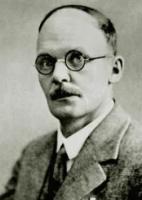| www.tmatlantic.com
Test & Soldering Equipment On-line Store |
|
D.E.V.I.C.E. (Wiki)Calculators Services |
|||||
Filter by first letter
|
Geiger, Johannes "Hans" Wilhelm
Hans Geiger is a German physicist who was the first to create a detector of alpha particles and other ionizing radiation. Hans Geiger was born on September 30, 1882 in Neustadt. After receiving a doctorate in 1906 from the University of Erlangen (Germany) Geiger soon began working at the University of Manchester. There he became one of Rutherford's most valuable colleagues. He built the first counter of charged particles, which variation was later used in experiments to determine the structure of the atom. In 1912 Geiger was named head of radiation research at the Physikalisch-Technische Reichsanstalt (Imperial Physical Technical Institute – PTR) in Charlottenburg. There he worked with Walter Bothe (winner of the 1954 Nobel Prize in Physics) and James Chadwick (winner of the 1935 Nobel Prize in Physics). After moving to the German National Institute of Science and Technology (Berlin) he continued to study the atomic structure. In 1925, having accepted an invitation to be a lecturer at the University of Kiel, he modernized the particle counter together with Walther Müller. At the University of Tübingen for the first time he observed the flow of cosmic rays, continued to work in the field of artificial radioactivity, nuclear decay. In 1936 Hans Geiger joined the Technical University of Berlin where he continued to research cosmic rays, nuclear fission and artificial radiation until his death. |
Measurement History Events
Units Converter
|
|
Site mapPrivacy policyTerms of Use & Store PoliciesHow to BuyShippingPayment |


























